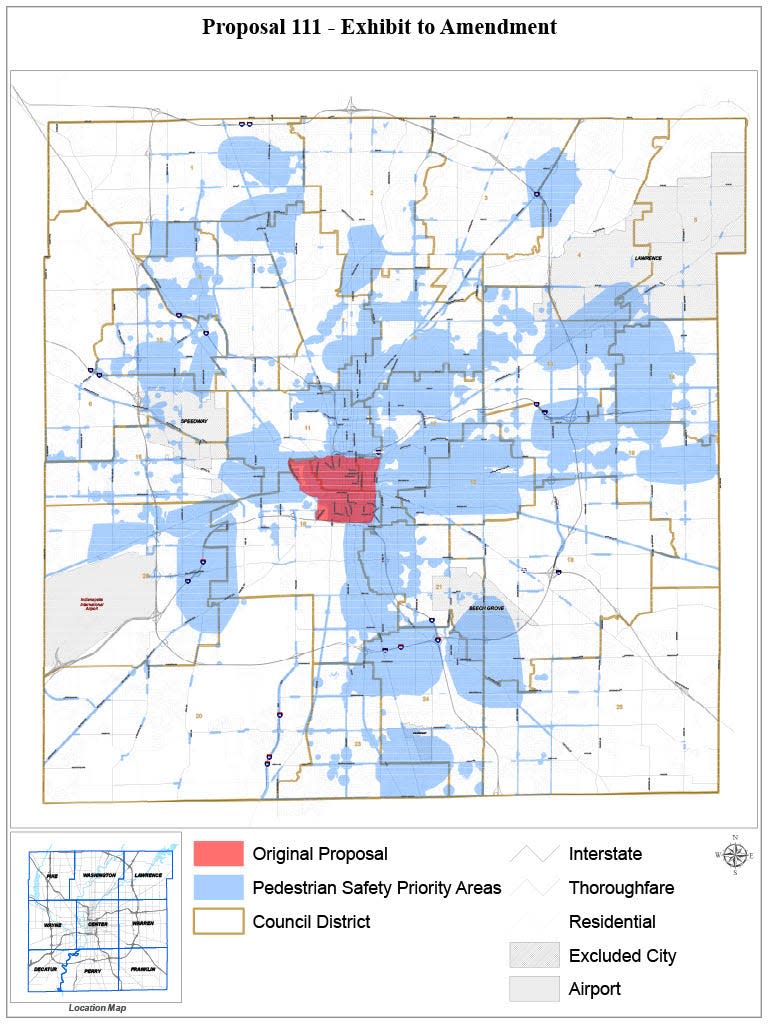In bid to protect pedestrians, Indy defies state lawmaker to push no-turn-on-red proposal
Indianapolis city-county councilors will defy state lawmakers and revive a plan to make downtown intersections no-turn-on-red.
Republican Sen. Aaron Freeman attempted in April to block the city from passing the plan to ban right-hand turns on red lights at all intersections downtown. Gov. Eric Holcomb last month signed this into law. The city initially conceded defeat before they discovered a loophole in Freeman's legislation, spurred by traffic safety advocates, as IndyStar first reported in May.
The councilors plan to exploit that the law appears to take effect after July 1. Freeman said he believes that the law started when the governor signed it. Freeman's law, an amendment to House Bill 1050, targets Indianapolis and bans the city from passing ordinances to put up new no-turn-on-red signs.
With the deadline looming, councilors said they plan to hear the downtown no-turn-on-red proposals at this Monday's full City-County Council meeting, where it is expected to pass.
This marks an unprecedented chance for the city to successfully undercut a trend of Indiana Republican senators inserting themselves into how Indianapolis' Democratic officials want to run the city.
"It's rather sad to have to jump through these kinds of hoops and loops for a city to be able to do what every other city in the state of Indiana is obligated to do in the pursuit of protecting pedestrians and their community," Council Vice-President Zach Adamson said.
Freeman told IndyStar Friday that he thinks the matter will go to litigation, because of the dispute over when the law takes effect, and stands by his previous comments that the idea is stupid.
The intersections affected include all local streets bounded by 11th Street, Oscar Robertson Boulevard, 10th Street, White River Parkway West Drive, Interstate 70 and Interstate 65. That would include all of Mile Square, Mass Ave downtown, and St. Joseph Historic Neighborhood.
The Indianapolis councilors behind the proposal — Adamson, Council President Vop Osili, and Councilor Kristin Jones — said evidence shows no-turn-on-red is a well-established best practice to reduce the number of pedestrians hit by vehicles.
Health By Design data shows that drivers failing to yield to pedestrians at intersections caused 55% of crashes downtown from 2010 to 2019.
This is just the latest legislation the state Senate has championed in recent years that targets Indianapolis, including everything from trying to prevent IndyGo from expanding transit lines to preventing the city from cracking down on bad landlords to preventing cities from targeting puppy mills just as Indianapolis was considering a proposal to do so.
Council seeks to retain power over no-turn-on-red laws
To give the city power to continue enacting no-turn-on-red restrictions even after July 1, the councilors also plan to amend the proposal to create "pedestrian safety priority areas" spanning large swathes of the city. In those areas, the Department of Public Works will have the authority to enact no-turn-on-red at signalized intersections where data supports it, if they choose to.

"This amendment is being offered to enable the city to continue taking proactive measures to protect the safety of all users of the roads within Marion County, as every other city has the authority and responsibility to do throughout Indiana," Adamson said.
Adamson said he believes this action will not be blocked by Freeman's law because the amendment would let the Department of Public Works put up new signs without the City-County Council having to first approve an ordinance to do so. Freeman's law specifically bans ordinances to put up a no-turn-on-red sign after July 1.
The pedestrian safety priority areas were identified through the Indianapolis Marion County pedestrian safety plans. It analyzed how widespread traffic crashes were in different areas to identify those that needed intervention, according to the National Highway Traffic Safety Administration standard.
Health, safety, equity, comfort, demand and city priorities were considered to find the hotspots where there is a high priority for improving pedestrian safety, Adamson said.
City's defiance puts it at odds with Freeman
There is disagreement over whether the loophole exists.
Councilors said they believe they are on solid legal ground to move forward with their plan, having confirmed with their legal counsel that the law is not in effect yet. Indiana Legislative Services Agency Executive Director George Angelone also said the law only takes effect July 1.
"This is just how the law reads," Adamson said.
But Freeman told IndyStar that he believed his amendment took effect when the governor signed it on May 4. The City-County Council's attorney also agreed on an initial read of the bill, which is why the council had announced in May that they were nixing the idea.
Freeman said that if the city proceeded with the downtown proposal, he presumed the matter would end up in a courtroom.
Freeman, who previously served on the City-County Council, has called the idea stupid, said its part of a Democratic war on cars, and that more enforcement and personal responsibility was the way to address pedestrians being killed or hurt in crashes, not a blanket ban.
"I'm all for local government until it's stupid," he said.
Adamson said he does not think the state should be interfering with Indianapolis on something as local as traffic control, and that it is inconsistent with their political philosophy of smaller government.
"I take personal affront to Sen. Freeman getting involved in my district with my constituents," Jones said, citing that one of no-turn-on-red measures being considered in her district, at Palmer and Meridian streets, was the direct result of a disabled resident raising safety fears at that intersection. "If he has a problem with that, so be it."
Contact IndyStar reporter Ko Lyn Cheang at kcheang@indystar.com or 317-903-7071. Follow her on Twitter: @kolyn_cheang.
This article originally appeared on Indianapolis Star: Indianapolis no-turn-on-red: City-County Council to defy legislature

